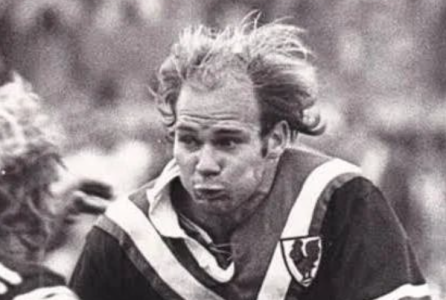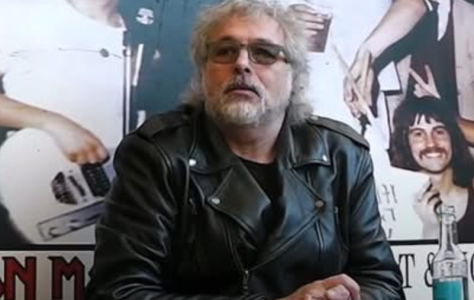Sport and music communities mourn loss of two influential figures
By
Gian T
- Replies 3
Two influential figures from the worlds of sport and music have sadly passed away.
A rugby league great, known for his premiership success and loyal club legacy, died at 76 after a battle with illness, while a former frontman of one of the biggest heavy metal bands died at 69, remembered for his early role in shaping a global music movement.
Mayes’ journey began as an Easts junior, cutting his teeth with the Bondi United side before being graded by the Roosters in 1968.
From there, he quickly established himself as a force to be reckoned with, playing 110 matches for the Tricolours and crossing the try line an impressive 55 times.
In 1975, he topped the league’s try-scoring tally. But it wasn’t just his stats that set him apart.
Mayes was a key figure in the Roosters’ back-to-back premiership triumphs in 1974 and 1975, playing alongside rugby league royalty like Arthur Beetson, Ronnie Coote, and John Peard under the legendary coach Jack Gibson.
His ability to read the game and create opportunities made him a linchpin in those championship teams.
Remarkably, Mayes’ winning streak didn’t start with the Roosters.
The year before, he was a star in Manly’s 1973 premiership-winning campaign, helping the Sea Eagles topple Cronulla.
This made him the first player in Australian rugby league history to win three consecutive premierships with multiple clubs—a feat that remains the stuff of legend.
Mayes’ talents weren’t confined to club footy. In 1975, he donned the green and gold, representing Australia in three Tests during the World Cup.
His performances on the international stage further cemented his reputation as one of the best halfbacks of his era.
The news of Mayes’ health struggles first emerged in April last year, when his son Glen revealed that an MRI had uncovered a very aggressive brain tumour.
The prognosis was grim, with doctors giving the family only weeks—perhaps a couple of months—left with their beloved patriarch.
Despite the dire outlook, Mayes showed the same resilience off the field that he had displayed throughout his playing days.
He defied the odds, spending precious extra time with his family, including his four children and six grandchildren, surrounded by love and support from former teammates and friends.
‘A lot of his teammates have called, and he has four kids and six grandkids, so there is a lot of love there,’ Glen shared at the time.
‘The only fortunate thing is that he is in no pain.’
Johnny Mayes’ passing is a poignant reminder of the impact one person can have, not just on a sport, but on a community.
His story is one of perseverance, teamwork, and the kind of quiet heroism that inspires those around him.
For many older Australians, Mayes’ career is a touchstone for the glory days of rugby league, when the game was as much about heart as it was about skill.
His achievements on the field will be remembered, but perhaps more importantly, so will his courage in the face of adversity and the love he shared with his family and friends.
As we reflect on Mayes’ life, there are lessons for all of us—about cherishing our loved ones, facing challenges with dignity, and leaving a legacy that goes beyond trophies and accolades.
His story is a powerful reminder to make the most of every moment, to support one another through tough times, and to celebrate the bonds that unite us.
Credit: YouTube
Meanwhile, Paul Mario Day’s journey with Iron Maiden began in the mid-1970s, a time when the British music scene was on the cusp of a seismic shift.
Recruited by bassist Steve Harris in late 1975, Day became the voice of a fledgling band that would soon become a global phenomenon.
Their first live performance took place on 1 May 1976 in Poplar, London, followed by a residency at a local pub in Stratford.
These early gigs were raw, energetic, and full of promise, laying the groundwork for what would become the New Wave of British Heavy Metal (NWOBHM).
However, Day’s tenure with Iron Maiden was short-lived—just 10 months. The reason? According to Day himself, it came down to stage presence.
In a candid 2019 interview, he recalled, 'Steve was saying, “You’ve got to get better. You’ve got to be more in the audience’s face. You’ve got to be commanding. You’ve got to be a hero.” And I agreed with him, but I didn’t actually know how to make that happen.'
Despite repeated warnings to up his game, Day struggled to find the charisma and energy that Harris demanded.
Eventually, he was let go—a decision that, while painful, became a turning point in his life.
'The worst experience was the best lesson,' Day reflected.
'I used that emotion, I guess, in my singing.'
Iron Maiden’s revolving door of vocalists continued after Day’s departure, with Dennis Wilcock and then Paul Di’Anno taking the mic before Bruce Dickinson’s arrival cemented the band’s classic lineup.
But Day’s story didn’t end there. Instead, he channelled his disappointment into new musical ventures, becoming a key figure in the NWOBHM movement.
In 1980, Day formed the heavy metal band More, a group that quickly made waves in the UK rock scene.
Their big break came in 1981 when they played the legendary Donington Monsters of Rock festival—a rite of passage for any serious metal act.
That same year, More supported Iron Maiden on their Killers tour, a full-circle moment that must have been bittersweet for Day.
He later joined Wildfire and even fronted the reformed glam rock band Sweet, where guitarist Andy Scott remembered him fondly: 'We needed a singer and when Paul arrived for the audition we looked no further.'
But Day’s journey didn’t stop at the UK’s shores. He eventually moved to Australia, where he continued to perform and share his love of music with new audiences.
Even as he battled cancer in his later years, Day remained active in the music community, a testament to his enduring spirit and dedication to his craft.
He spent his final days in hospice care, surrounded by loved ones, and is survived by his wife, Cecily.
Paul Mario Day’s story reminds us that not every rock legend is a household name, but their influence can be felt in the music we love and the lives they touch.
His bandmates in More described him as 'a huge part of the new wave of British heavy metal' and 'a well-loved figure in British rock music'—a fitting tribute to a man who helped shape a genre, even if his time in the spotlight was brief.
Credit: YouTube

As the worlds of sport and music say goodbye to two remarkable figures, we’re reminded of the lasting power of legacy.
Johnny Mayes inspired generations on the footy field with his grit, talent, and quiet strength, while Paul Mario Day helped shape a global music movement with raw passion and persistence.
Though their paths were different, both men left behind more than records and performances—they left stories, memories, and inspiration that will echo far beyond their final chapters.
Rest in peace.
Read more: 'His time is limited': Aussie footy legend faces heartbreaking diagnosis
A rugby league great, known for his premiership success and loyal club legacy, died at 76 after a battle with illness, while a former frontman of one of the biggest heavy metal bands died at 69, remembered for his early role in shaping a global music movement.
Mayes’ journey began as an Easts junior, cutting his teeth with the Bondi United side before being graded by the Roosters in 1968.
From there, he quickly established himself as a force to be reckoned with, playing 110 matches for the Tricolours and crossing the try line an impressive 55 times.
In 1975, he topped the league’s try-scoring tally. But it wasn’t just his stats that set him apart.
Mayes was a key figure in the Roosters’ back-to-back premiership triumphs in 1974 and 1975, playing alongside rugby league royalty like Arthur Beetson, Ronnie Coote, and John Peard under the legendary coach Jack Gibson.
His ability to read the game and create opportunities made him a linchpin in those championship teams.
Remarkably, Mayes’ winning streak didn’t start with the Roosters.
The year before, he was a star in Manly’s 1973 premiership-winning campaign, helping the Sea Eagles topple Cronulla.
This made him the first player in Australian rugby league history to win three consecutive premierships with multiple clubs—a feat that remains the stuff of legend.
Mayes’ talents weren’t confined to club footy. In 1975, he donned the green and gold, representing Australia in three Tests during the World Cup.
His performances on the international stage further cemented his reputation as one of the best halfbacks of his era.
The news of Mayes’ health struggles first emerged in April last year, when his son Glen revealed that an MRI had uncovered a very aggressive brain tumour.
The prognosis was grim, with doctors giving the family only weeks—perhaps a couple of months—left with their beloved patriarch.
Despite the dire outlook, Mayes showed the same resilience off the field that he had displayed throughout his playing days.
He defied the odds, spending precious extra time with his family, including his four children and six grandchildren, surrounded by love and support from former teammates and friends.
‘A lot of his teammates have called, and he has four kids and six grandkids, so there is a lot of love there,’ Glen shared at the time.
‘The only fortunate thing is that he is in no pain.’
Johnny Mayes’ passing is a poignant reminder of the impact one person can have, not just on a sport, but on a community.
His story is one of perseverance, teamwork, and the kind of quiet heroism that inspires those around him.
For many older Australians, Mayes’ career is a touchstone for the glory days of rugby league, when the game was as much about heart as it was about skill.
His achievements on the field will be remembered, but perhaps more importantly, so will his courage in the face of adversity and the love he shared with his family and friends.
As we reflect on Mayes’ life, there are lessons for all of us—about cherishing our loved ones, facing challenges with dignity, and leaving a legacy that goes beyond trophies and accolades.
His story is a powerful reminder to make the most of every moment, to support one another through tough times, and to celebrate the bonds that unite us.
Credit: YouTube
Meanwhile, Paul Mario Day’s journey with Iron Maiden began in the mid-1970s, a time when the British music scene was on the cusp of a seismic shift.
Recruited by bassist Steve Harris in late 1975, Day became the voice of a fledgling band that would soon become a global phenomenon.
Their first live performance took place on 1 May 1976 in Poplar, London, followed by a residency at a local pub in Stratford.
These early gigs were raw, energetic, and full of promise, laying the groundwork for what would become the New Wave of British Heavy Metal (NWOBHM).
However, Day’s tenure with Iron Maiden was short-lived—just 10 months. The reason? According to Day himself, it came down to stage presence.
In a candid 2019 interview, he recalled, 'Steve was saying, “You’ve got to get better. You’ve got to be more in the audience’s face. You’ve got to be commanding. You’ve got to be a hero.” And I agreed with him, but I didn’t actually know how to make that happen.'
Despite repeated warnings to up his game, Day struggled to find the charisma and energy that Harris demanded.
Eventually, he was let go—a decision that, while painful, became a turning point in his life.
'The worst experience was the best lesson,' Day reflected.
'I used that emotion, I guess, in my singing.'
Iron Maiden’s revolving door of vocalists continued after Day’s departure, with Dennis Wilcock and then Paul Di’Anno taking the mic before Bruce Dickinson’s arrival cemented the band’s classic lineup.
But Day’s story didn’t end there. Instead, he channelled his disappointment into new musical ventures, becoming a key figure in the NWOBHM movement.
In 1980, Day formed the heavy metal band More, a group that quickly made waves in the UK rock scene.
Their big break came in 1981 when they played the legendary Donington Monsters of Rock festival—a rite of passage for any serious metal act.
That same year, More supported Iron Maiden on their Killers tour, a full-circle moment that must have been bittersweet for Day.
He later joined Wildfire and even fronted the reformed glam rock band Sweet, where guitarist Andy Scott remembered him fondly: 'We needed a singer and when Paul arrived for the audition we looked no further.'
But Day’s journey didn’t stop at the UK’s shores. He eventually moved to Australia, where he continued to perform and share his love of music with new audiences.
Even as he battled cancer in his later years, Day remained active in the music community, a testament to his enduring spirit and dedication to his craft.
He spent his final days in hospice care, surrounded by loved ones, and is survived by his wife, Cecily.
Paul Mario Day’s story reminds us that not every rock legend is a household name, but their influence can be felt in the music we love and the lives they touch.
His bandmates in More described him as 'a huge part of the new wave of British heavy metal' and 'a well-loved figure in British rock music'—a fitting tribute to a man who helped shape a genre, even if his time in the spotlight was brief.
Credit: YouTube
Key Takeaways
- The sporting community is mourning Johnny Mayes, a legendary halfback who won three consecutive premierships with multiple clubs and represented Australia at an international level, remembered not only for his achievements but also his courage in facing illness.
- Mayes’ unique contribution to rugby league includes being the first player in Australian history to win three straight premierships with two different clubs, and his legacy endures through the love and respect of teammates, family, and fans.
- The music world is also paying tribute to Paul Mario Day, Iron Maiden’s original frontman, whose brief time with the band helped lay the foundations for the New Wave of British Heavy Metal, before he went on to front other influential acts like More and Wildfire.
- Both Johnny Mayes and Paul Mario Day spent their final days surrounded by loved ones, with their stories serving as powerful reminders to face adversity with dignity, cherish connections, and recognise that influence extends beyond fame or trophies.
As the worlds of sport and music say goodbye to two remarkable figures, we’re reminded of the lasting power of legacy.
Johnny Mayes inspired generations on the footy field with his grit, talent, and quiet strength, while Paul Mario Day helped shape a global music movement with raw passion and persistence.
Though their paths were different, both men left behind more than records and performances—they left stories, memories, and inspiration that will echo far beyond their final chapters.
Rest in peace.
Read more: 'His time is limited': Aussie footy legend faces heartbreaking diagnosis









